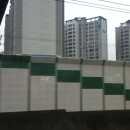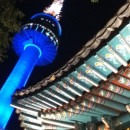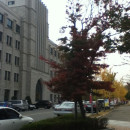Korea Univerisity Sejong Campus: Changing your world" Past Review
By Matthew B (Mechanical Engineering., New Mexico State University) for
University of Seoul: Seoul - Direct Enrollment & Exchange
I gained a much deeper understanding for how Confucianism still affects many aspects of Korean culture, and especially in professional settings like the classroom and the workplace. I learned more about the language and was able to delve further into the mind of Korea and understand their common-held beliefs more fully. Most of all, I gained a greater appreciation for the amount of love and compassion that Koreans have and are willing to bestow upon those in need, which includes pretty much any American visitor to their country.
Review Photos





Personal Information
| How much international exposure did you have prior to this program? | 6 months+ |
Review Your Program
|
* Overall educational experience
Academic rigor, intensity, resources, etc. |
Korea University overall has a much smaller workload that NMSU. Most classes do not require a great deal of homework. Class attendance is considered very important in Korea, more than in the USA. Students are much more quiet and deferential to their instructors, and class discussion is rare. Grading differs in KUS, but the English courses the exchange students take are graded at the teacher's discretion. The classes were challenging in their own way, and educational. The advanced Korean language class and the Korean Culture class were especially fantastic. The school spared little expense to help all those in our program have a hands-on Korean experience. |
|
* Host Country Program Administration
On-site administration of your program |
In the world, there cannot be a better program, and it is because of the people in charge of the program. The Office of International Affairs and Education at KUS is full of wonderful, giving, self-sacrificing, loving people. They are the epitome of Korean hospitality, and you could not possibly ask for more. Anything about the program which may be lacking is made perfect through their kindness. |
|
* Housing:
How satisfied were you with your living arrangements? |
You need to have your own toiletries and personal items for the dorms. I lived with two Koreans, both of whom spoke English fairly well. I felt a need to help them speak English better and so I spoke only English with them. |
| * Food: |
The food is plentiful, delicious and healthy. However, you have to eat outside the cafeteria or else pay extra for lunch and weekends. |
|
* Social & Cultural Integration:
How integrated did you feel with the local culture? |
Until you have experienced it, you just won't understand but Korea is an absolute riot! There is always always always something amazingly fun happening. Your problem is not finding something to do, but choosing between all the many options. |
|
* Health Care:
How well were health issues addressed during the program? |
|
| * Safety: |
Korea is a very safe country, much more safe than any part of America. Jochiwon, the host city, is rural and especially safe. There is an on campus clinic which provides free medicine. Hospital visits are cheap when compared with the US, and if you ask, the Office of International Affairs and Education will do anything for you, including driving you to the hospital and staying there to translate for you and making sure you get the help you need. |
| If you could do it all over again would you choose the same program? |
Yes
|
Finances
|
* Money: How easily were you able to live on a student's budget?
(1 = not very easy/$200+ on food & personal expenses/week, 2.5 = $100/week, 5 = very easily/minimal cost) |
|
| Do you have any general money-saving tips for future study abroad participants? | The school gives to scholarship money, but it takes awhile to get it. Be ready to spend your own money for a month or so over there. |
Language
| * Did your program have a foreign language component? | Yes |
| Language acquisition improvement? |
In Korea, most people speak some amount of English, and around campus there are quite a few people who speak English very well. However, for those with interest and motivation there was plenty of chances to learn and speak Korean inside and outside of class. |
| If applicable, to what degree did your living situation aid your language acquisition? |
|
Other Program Information
|
* Where did you live?
Select all that apply |
|
|
* Who did you live with?
Select all that apply |
|
A Look Back
| * What did you like most about the program? |
|
| * What could be improved? |
|
| * What do you know now that you wish you knew before going on this program? | KUS offers the chance of a lifetime with its ITS program. If you are interested in Korea, or Asia, or just want to study abroad, my advice would be DON'T MISS OUT ON THIS PROGRAM! It is unparalleled. |
Individual Course Reviews
| Course Name/Rating: |
Korean Language (advanced) |
| Course Department: | |
| Instructor: | Moonsung Lee |
| Instruction Language: | Korean |
| Comments: | It was great. We studied the language through, history, politics, society, pop-culture and media, traditional Korean culture. |
| Credit Transfer Issues: |
| Course Name/Rating: |
Engineering Math II |
| Course Department: | |
| Instructor: | Kim Hwi |
| Instruction Language: | English |
| Comments: | The instructor speaks great English, he's one of the best I heard. He is also very helpful. However, I would recommend extreme caution to any American thinking of taking a math class in Korea. Koreans study up through calculus as, well as other topics like the basics of complex analysis and matrix problems and formulas before they ever graduate high school, so their math is super advanced. Unless you have taken classes up through a math minor equivalent in the US, I wouldn't recommend even trying a Korean math class. They'll tell you its easy. It is for them. It probably won't be for you. |
| Credit Transfer Issues: |
| Course Name/Rating: |
Korean Culture |
| Course Department: | |
| Instructor: | Moonsung Lee |
| Instruction Language: | English (Korean to me) |
| Comments: | The class gives us a chance to really learn about Korean culture by experiencing it first-hand. We went to national landmarks and museums, slept in a Buddhist temple with the monks and visited palaces. The course was paid for by KUS. The Professor is an awesome guy. He speaks English well enough, but to give a greater chance to learning and understanding to everyone he often asked the students from the Advanced Korean language class to translate and spoke to us in Korean. |
| Credit Transfer Issues: |
| Course Name/Rating: |
Exercise Science |
| Course Department: | |
| Instructor: | Kim Sangho |
| Instruction Language: | English |
| Comments: | I say the language for the class in English because that is what it is on paper, but the professor, despite being good at English, doesn't feel confident teaching in English. He told us he would speak mostly in English, but when I said I could try and help if he needed it, he decided to speak mostly in Korean and only say the technical scientific terms in English and let me translate for the two other Americans in the class. It worked out alright. I doubt the professor would do that again, but future foreign students taking the class should be prepared to spend at least a little time twiddling their thumbs while he says things in Korean they don't understand so that the Korean students will understand. Like most Koreans though, the professor is a really great guy, and will bend over backwards to help you in any way possible if you just ask. |
| Credit Transfer Issues: |








